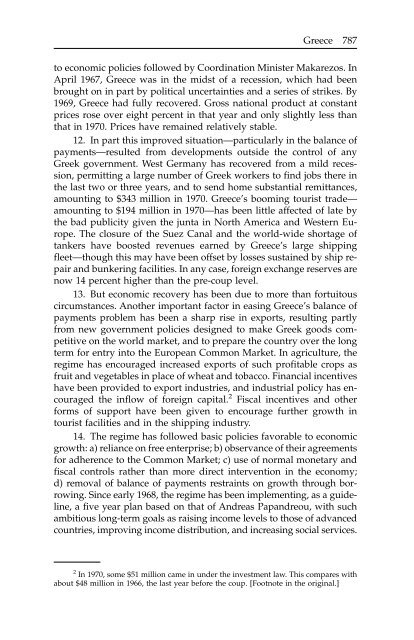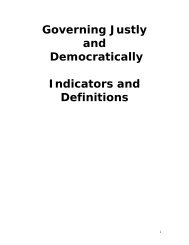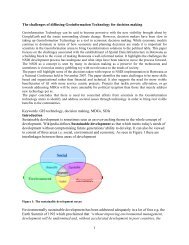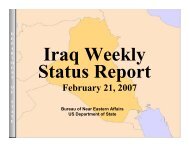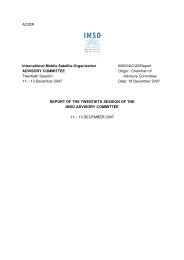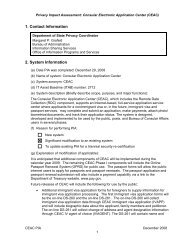Greece - US Department of State
Greece - US Department of State
Greece - US Department of State
You also want an ePaper? Increase the reach of your titles
YUMPU automatically turns print PDFs into web optimized ePapers that Google loves.
<strong>Greece</strong> 787<br />
to economic policies followed by Coordination Minister Makarezos. In<br />
April 1967, <strong>Greece</strong> was in the midst <strong>of</strong> a recession, which had been<br />
brought on in part by political uncertainties and a series <strong>of</strong> strikes. By<br />
1969, <strong>Greece</strong> had fully recovered. Gross national product at constant<br />
prices rose over eight percent in that year and only slightly less than<br />
that in 1970. Prices have remained relatively stable.<br />
12. In part this improved situation—particularly in the balance <strong>of</strong><br />
payments—resulted from developments outside the control <strong>of</strong> any<br />
Greek government. West Germany has recovered from a mild recession,<br />
permitting a large number <strong>of</strong> Greek workers to find jobs there in<br />
the last two or three years, and to send home substantial remittances,<br />
amounting to $343 million in 1970. <strong>Greece</strong>’s booming tourist trade—<br />
amounting to $194 million in 1970—has been little affected <strong>of</strong> late by<br />
the bad publicity given the junta in North America and Western Europe.<br />
The closure <strong>of</strong> the Suez Canal and the world-wide shortage <strong>of</strong><br />
tankers have boosted revenues earned by <strong>Greece</strong>’s large shipping<br />
fleet—though this may have been <strong>of</strong>fset by losses sustained by ship repair<br />
and bunkering facilities. In any case, foreign exchange reserves are<br />
now 14 percent higher than the pre-coup level.<br />
13. But economic recovery has been due to more than fortuitous<br />
circumstances. Another important factor in easing <strong>Greece</strong>’s balance <strong>of</strong><br />
payments problem has been a sharp rise in exports, resulting partly<br />
from new government policies designed to make Greek goods competitive<br />
on the world market, and to prepare the country over the long<br />
term for entry into the European Common Market. In agriculture, the<br />
regime has encouraged increased exports <strong>of</strong> such pr<strong>of</strong>itable crops as<br />
fruit and vegetables in place <strong>of</strong> wheat and tobacco. Financial incentives<br />
have been provided to export industries, and industrial policy has encouraged<br />
the inflow <strong>of</strong> foreign capital. 2 Fiscal incentives and other<br />
forms <strong>of</strong> support have been given to encourage further growth in<br />
tourist facilities and in the shipping industry.<br />
14. The regime has followed basic policies favorable to economic<br />
growth: a) reliance on free enterprise; b) observance <strong>of</strong> their agreements<br />
for adherence to the Common Market; c) use <strong>of</strong> normal monetary and<br />
fiscal controls rather than more direct intervention in the economy;<br />
d) removal <strong>of</strong> balance <strong>of</strong> payments restraints on growth through borrowing.<br />
Since early 1968, the regime has been implementing, as a guideline,<br />
a five year plan based on that <strong>of</strong> Andreas Papandreou, with such<br />
ambitious long-term goals as raising income levels to those <strong>of</strong> advanced<br />
countries, improving income distribution, and increasing social services.<br />
2 In 1970, some $51 million came in under the investment law. This compares with<br />
about $48 million in 1966, the last year before the coup. [Footnote in the original.]


